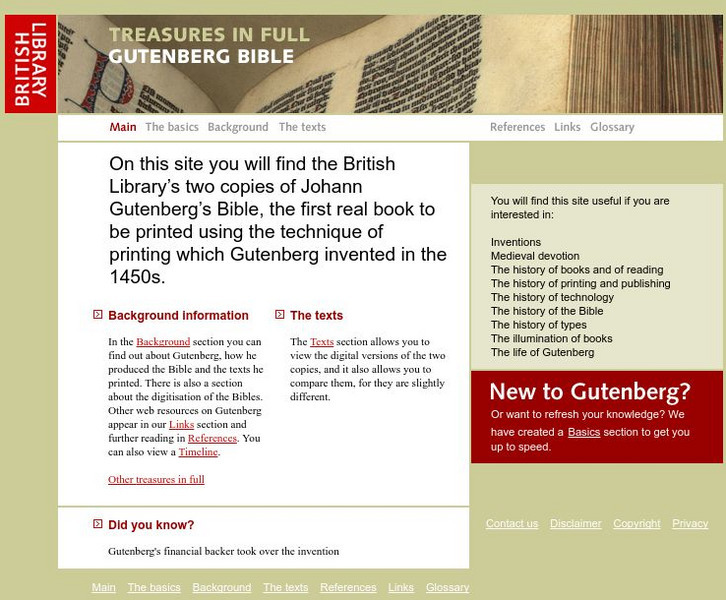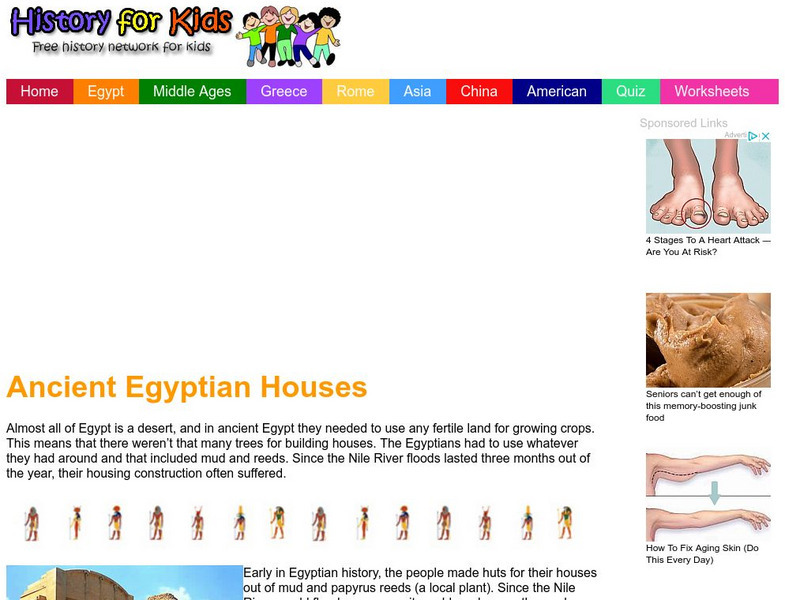University of Texas at Austin
The Gutenberg Bible
A massive resource featuring the first book printed using movable type, the Gutenberg Bible printed around 1454 in Germany. There are articles dealing with the printing of the book, its history and much more. There is also a section...
British Library
British Library: The Gutenberg Bible
At this website from The British Library, one can view high quality digitized images of the Gutenberg Bible. Also includes biographical information on Gutenberg as well as notes on how his Bible was made and interesting details about it.
Other
Gutenberg Digital: Gutenberg and the Gutenberg Bible
An incredible website offering the entire Gutenberg Bible, information about Gutenberg and the history of printing. Rich variety of images and a wealth of information. Loading times will be slow, so be patient. Interactive and complete -...
Great Idea Finder
The Great Idea Finder: Gutenberg Bible
This page profiles the Gutenberg Bible and the moveable type process used to print. Contains bibliography information and related links.
Other
Gutenberg: Man of the Millennium (German and English)
This resource offers information on Johannes Gutenberg and the history of printing in Germany.
Library of Congress
Loc: Library of Congress Bible Collection
Explore, compare, and contrast aspects of the Mainz and Gutenberg Bibles as well as sixteen other bibles as you learn about the history and characteristics of each of the Bibles. These Bibles document a history of Western ideas,...
Other
Uwm Libraries: The Bible
This site provides information about the Gutenberg Bible also known as the "42-line Bible." Includes images which can be enlarged for viewing purposes.
University of Virginia
Univ. Of Virginia: Electronic Labyrinth: Johannes Gutenberg and the Printed Book
This article describes how Gutenberg revolutionized printing.
Other
The Second Millenia: Gutenberg: 1455 Printed Matters
This website discusses the life and times of Johann Gutenberg and the first printed Bible, also known as the "42 line Bible." It mentions printing techniques.
Stephen Byrne
History for Kids: Johannes Gutenberg
History for Kids features the history of Johannes Guttenberg a German goldsmith, printer and publisher who is best known for developing a Movable Type for printing. Includes worksheets, activities and quizzes.
C3 Teachers
C3 Teachers: Inquiries: Printing Press
A comprehensive learning module on the invention of the printing press that includes three supporting questions accompanied by formative tasks and primary source materials, followed by a summative performance task. Students will learn...
Other
Annie Sechrist: The Role of the Printing Press in the Reformation
Handwritten bibles were seldom found anywhere but within the walls of churches or in the hands of clergymen until the printing press afforded the opportunity for more production, faster, so that anyone willing and able to purchase one...
Huntington Library
Huntington Library: The Latin Legacy: Language as a Cultural Marker [Pdf]
In this lesson plan, 6th graders examine to what extent an imported language endures in a place over time. They will look at pages in Latin from the Gutenberg Bible, a Latin version of "The Lord's Prayer," and an English version of the...
British Library
British Library: Discovering Literature: William Caxton and the Introduction of Printing to England
This article explains how William Caxton brought the printing press to England and published printed versions of works by writers including Chaucer, Malory, Gower, Cicero, and Virgil.










